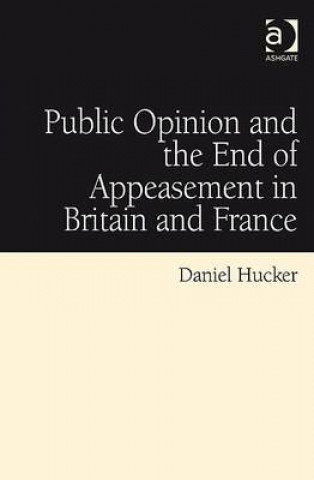
Kód: 04782198
Public Opinion and the End of Appeasement in Britain and France
Autor Daniel Hucker
The 1930s policy of appeasement is still fiercely debated by historians, critics and contemporary political commentators, more than 70 years after the signing of the 1938 Munich Agreement. What is less well-understood, however, is ... celý popis
- Jazyk:
 Angličtina
Angličtina - Väzba: Pevná
- Počet strán: 304
Nakladateľ: Taylor & Francis Ltd, 2011
- Viac informácií o knihe

Mohlo by sa vám tiež páčiť
-

Twentieth-Century South Africa
24.30 € -10 % -

Philip de Laszlo
80.48 € -9 % -

New House
24.09 € -

Cognitive Radio and Dynamic Spectrum Access
139.61 € -

AG 2001 Election Supplement Magazine
42.99 € -

Living Health; Phiri's Goal
8.47 € -

Bill Henson
176.69 €
Darčekový poukaz: Radosť zaručená
- Darujte poukaz v ľubovoľnej hodnote, a my sa postaráme o zvyšok.
- Poukaz sa vzťahuje na všetky produkty v našej ponuke.
- Elektronický poukaz si vytlačíte z e-mailu a môžete ho ihneď darovať.
- Platnosť poukazu je 12 mesiacov od dátumu vystavenia.
Viac informácií o knihe Public Opinion and the End of Appeasement in Britain and France
Nákupom získate 538 bodov
 Anotácia knihy
Anotácia knihy
The 1930s policy of appeasement is still fiercely debated by historians, critics and contemporary political commentators, more than 70 years after the signing of the 1938 Munich Agreement. What is less well-understood, however, is the role of public opinion on the formation of British and French policy in the period between Munich and the outbreak of the Second World War; not necessarily what public opinion was but how it was perceived to be by those in power and how this contributed to the policymaking process. It therefore fills a considerable gap in an otherwise vast literature, seeking to ascertain the extent to which public opinion can be said to have influenced the direction of foreign policy in a crucial juncture of British and French diplomatic history. Employing an innovative and unique methodological framework, the author distinguishes between two categories of representation: firstly, 'reactive' representations of opinion, the immediate and spontaneous reactions of the public to circumstances/events as they occur; and secondly, 'residual' representations, which can be defined as the remnants of previous memories and experiences, the more general tendencies of opinion considered characteristic of previous years, even previous decades. It is argued that the French government of Edouard Daladier was consistently more attuned to the evolution of 'reactive' representations than the British government of Neville Chamberlain and, consequently, it was the French rather than the British who first pursued a firmer policy towards the European dictatorships. This comparative approach reveals a hitherto hidden facet of the diplomatic prelude to the Second World War; that British policy towards France and French policy towards Britain were influenced by their respective perceptions of public opinion in the other country. A sophisticated analysis of a crucial period in international history, this book will be essential reading for scholars of the origins of World War II, the political scenes of late 1930s Britain and France, and the study of public opinion and it affects on policy.
 Parametre knihy
Parametre knihy
Zaradenie knihy Knihy po anglicky Humanities History Regional & national history
217.24 €
- Celý názov: Public Opinion and the End of Appeasement in Britain and France
- Autor: Daniel Hucker
- Jazyk:
 Angličtina
Angličtina - Väzba: Pevná
- Počet strán: 304
- EAN: 9781409406259
- ISBN: 1409406253
- ID: 04782198
- Nakladateľ: Taylor & Francis Ltd
- Hmotnosť: 614 g
- Rozmery: 242 × 163 × 24 mm
- Dátum vydania: 28. January 2011
Obľúbené z iného súdka
-

Hundred Years' War on Palestine
13.27 € -23 % -

Ethnic Cleansing of Palestine
12.86 € -24 % -

History of Japan
16.33 € -19 % -

Ten Myths About Israel
13.57 € -14 % -

Strange Death of Europe
15.21 € -21 % -

Decline and Fall of the Roman Empire
5.91 € -21 % -

Secret History
13.78 € -21 % -

God's Playground A History of Poland
68.63 € -

Mayflower
15.72 € -23 % -

How to be a Victorian
14.39 € -23 % -

Plantagenets
13.27 € -29 % -

General's Son
20.21 € -4 % -

Iran: A Very Short Introduction
11.53 € -19 % -

Temples of Karnak
153.40 € -

Cuneiform
11.12 € -23 % -

Twenty Years A-Growing
10.10 € -22 % -

History of Witchcraft in England from 1558 to 1718
18.99 € -

Bohemian Paris
16.74 € -17 % -

China in Africa
37.37 € -

Islandman
11.12 € -19 % -

Alexiad
17.76 € -20 % -

Lancaster And York
22.87 € -

Modern France: A Very Short Introduction
11.53 € -19 % -

Inside Hitler's Greece
21.03 € -20 % -

Diana: Her True Story - In Her Own Words
11.02 € -23 % -

The Fourth Turning
19.60 € -6 % -

The Oxford History of Ancient Egypt
17.97 € -19 % -

Churchill: The Power of Words
15.11 € -22 % -

Palestine
20.32 € -19 % -

Korean History in Maps
27.98 € -10 % -

Great Gatsby (Wisehouse Classics Edition)
16.13 € -37 % -

Viking Way
46.16 € -7 % -

The Thirteenth Tribe
12.55 € -

My Promised Land
18.48 € -

Vanished Kingdoms
18.78 € -22 % -

Age Of Revolution
16.54 € -23 % -

Life and Death of Anne Boleyn
22.97 € -

Coming of the Third Reich
18.68 € -23 % -

Children of Ash and Elm
18.68 € -23 % -

Europe Between the Oceans
34.21 € -7 % -

Socialism Betrayed
19.50 € -19 % -

303 Squadron
19.40 € -17 % -

Ancient Celts, Second Edition
26.75 € -19 % -

Dancing in the Glory of Monsters
15.82 € -22 % -

Battle of Britain: Luftwaffe Blitz (Images of War)
25.83 € -1 % -

Age of Confucian Rule
35.94 € -

Beyond Band of Brothers
16.54 € -23 % -

Benjamin Franklin
18.78 € -12 % -

On China
17.25 € -20 %
Osobný odber Bratislava a 2642 dalších
Copyright ©2008-24 najlacnejsie-knihy.sk Všetky práva vyhradenéSúkromieCookies



 21 miliónov titulov
21 miliónov titulov Vrátenie do mesiaca
Vrátenie do mesiaca 02/210 210 99 (8-15.30h)
02/210 210 99 (8-15.30h)